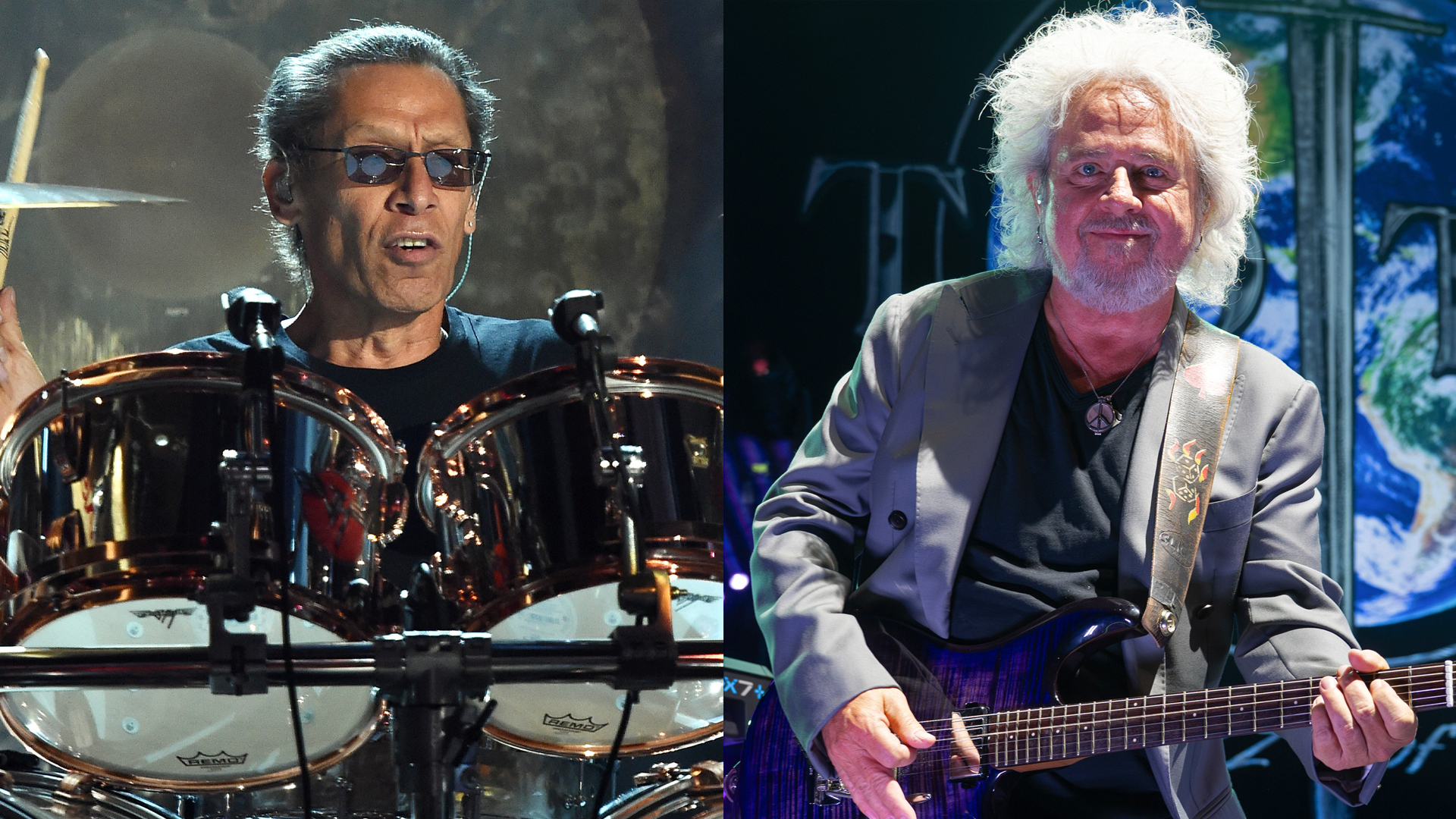“I have a few guitars but if I don’t play them for a while, I punish myself by giving them away. It’s not fair to have a guitar in a lockup…” The Pretenders’ Chrissie Hynde and James Walbourne on songwriting and the “solo-shy” James Honeyman-Scott
Chrissie Hynde has been leading The Pretenders for 45 years now. She and co-guitarist James Walbourne on developing style, the pressure to stay faithful to old guitar parts and more...
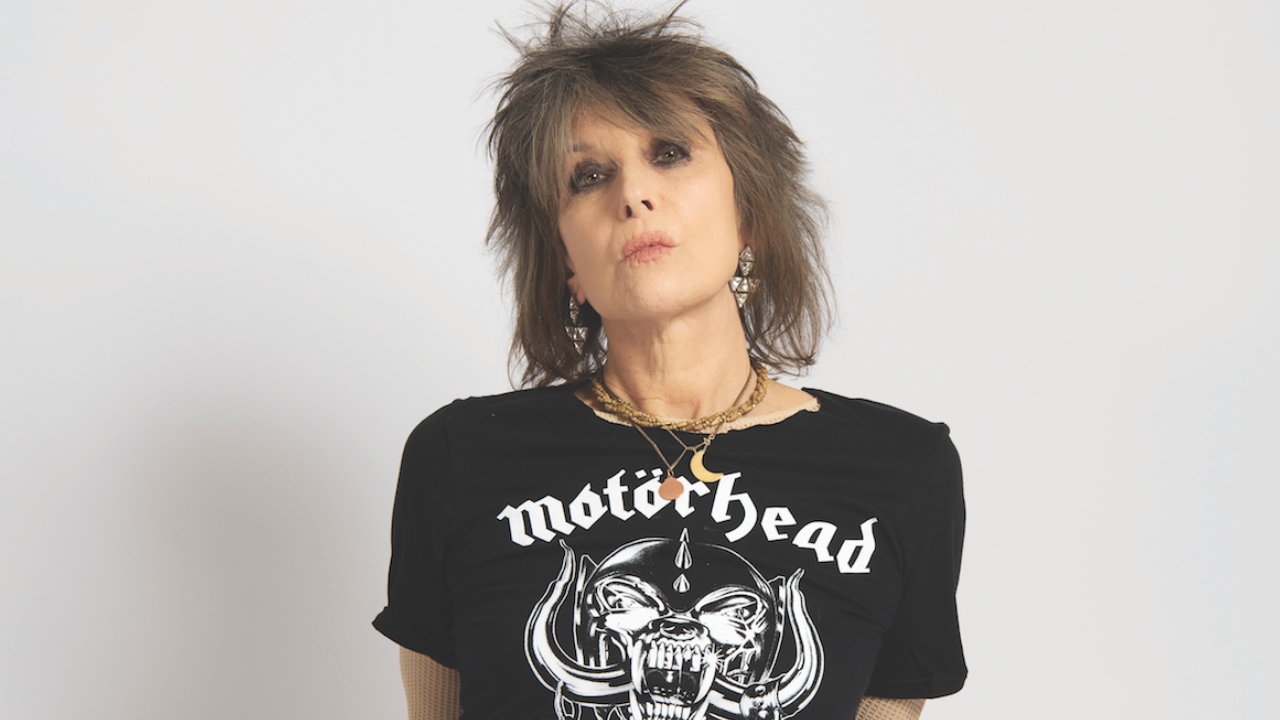
All the latest guitar news, interviews, lessons, reviews, deals and more, direct to your inbox!
You are now subscribed
Your newsletter sign-up was successful
You can say this: Relentless (Parlophone), the 12th and latest studio album from the Pretenders, is aptly named. Since forming 45 years ago, in 1978, the group has endured deaths — the melodically gifted lead guitarist James Honeyman-Scott, in 1982, and bassist Pete Farndon, in 1983 — as well as lineup changes and the vicissitudes of popular culture. Through it all, frontwoman and guitarist Chrissie Hynde has remained the sole constant force behind the group.
But since 2008, she’s had an equally persistent partner in guitarist James Walbourne, who has served as Hynde’s musical foil. Walbourne is not only an astounding guitarist but also Hynde’s writing partner, co-penning the band’s last two albums with her.
On Relentless, Hynde and Walbourne combine familiar elements of the band’s past work with some unexpected twists and turns, which makes for quite a different-sounding album from its predecessor, 2020’s Hate for Sale. As it so happens, the change in direction was not at all unintentional.
“We did want to have a punchier, punkier sound on Hate and we were looking toward a different approach for this record — something a little more low-key,” Hynde tells Guitar Player. “We used keyboards on a lot of the songs when we recorded it. Having said that, after the initial recording, I got James to re-do a lot of the bass lines. It was almost too lightweight and soft.
“At the end of the day, we are a rock band, so things did toughen up somewhat when we actually recorded the songs.”
Chrissie, you were always primarily a solo writer. How did the two of you start writing together, and how does the collaborative writing process work for you?
CHRISSIE HYNDE I had such a great live relationship with James — he’s such a fantastic player and a great showman as well — and I think I was slightly nervous about writing with him. I was worried that if I tried to do that and it didn’t work out, it might jeopardize the good thing that we had going.
All the latest guitar news, interviews, lessons, reviews, deals and more, direct to your inbox!
JAMES WALBOURNE It took us over 10 years to write a song together. The first song was “You Can’t Hurt a Fool,” from Hate for Sale. The floodgates opened after that, but it was so nerve wracking when I sent her my first ideas, knowing how great she is as a writer.
HYNDE With Hate for Sale, we had a very specific plan about how we wanted to write together, and we stuck to it. During lockdown, we decided to do some Bob Dylan covers, just for something to do; it wasn’t planned to be an album.
I’d put some chords down on my phone and send it to him, and he’d work on it and send it back to me, and that was how we put those Dylan songs together that became Standing in the Doorway in 2021.
With that process working so well, we just carried on in the same way with the songs for this album. I’d send lyrics to James, or sing some ideas, then he’d work on them and come back to me until we had the song.
WALBOURNE Chrissie would just send the lyrics, with no guidelines at all as to how it should sound. I’d work out all the musical parts and send them back, and she didn’t really change much at all about what I came up with.
Of course, as soon as she starts singing, it sounds entirely different from the version that I sent to her. [laughs] Her vocal takes it to an entirely different level. She puts her own feel on it and it becomes Chrissie.
Are you perfectionists, where you hear things and wish you could have done things differently?
HYNDE Well, in the days of yore, when you made your first album you’d have been playing the songs live for a few years in clubs and whatever. You played those songs and refined them live to the point where you knew exactly what you wanted them to sound like.
Nowadays, it seems like people go into the studio and make an album when they come off tour, and record songs that they haven’t played live.
We’re playing the songs from the album as a four-piece, rather than with the expanded line-up that made the record, so there are changes that we’ve made there already. But that’s the name of the game. I wouldn’t actually change anything about the record, but it does seem a little back-to-front the way that the business works these days.
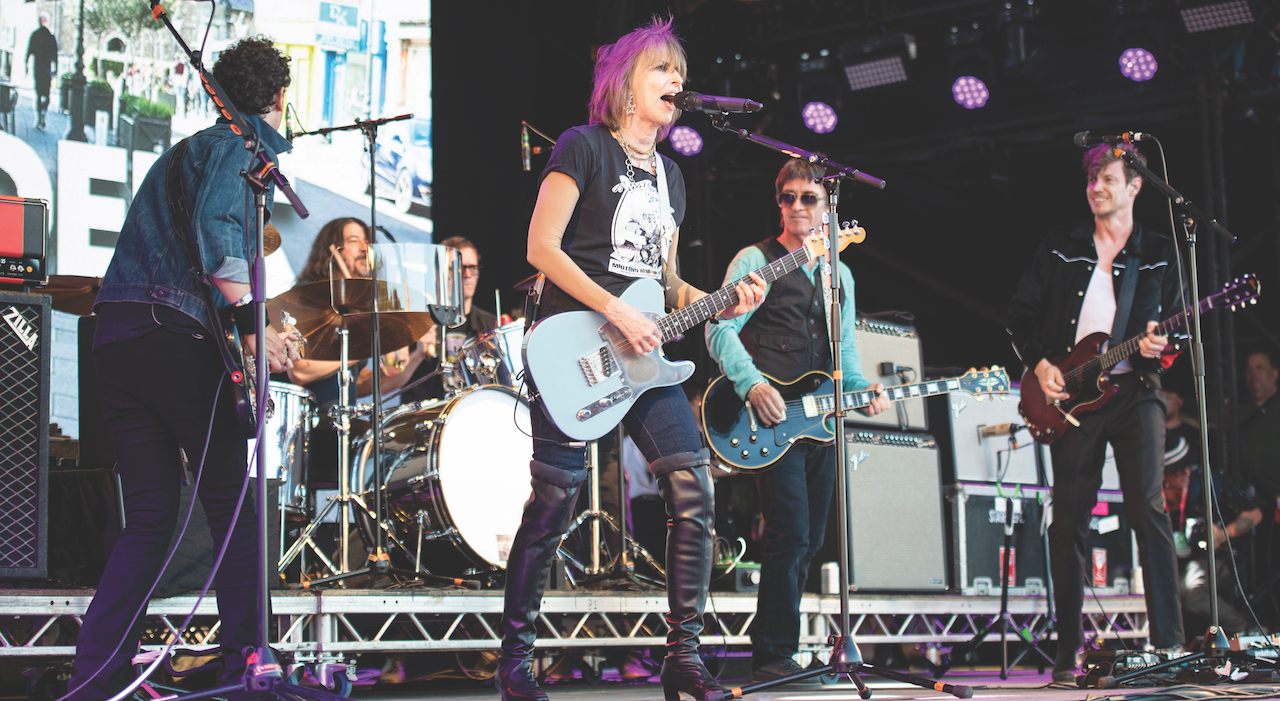
WALBOURNE I think an album is a snapshot of a moment. Most of this record was recorded live in the studio, and that’s where the magic takes place.
HYNDE I’m very pleased with it, but it’s way behind us now. These days you have to wait nine months for the vinyl to get pressed because there’s such a backlog, so it doesn’t feel new from our perspective. We’ve lived with it for a long time.
There are some great tones on the record. What were the main guitars and amps that you used?
HYNDE For me, a Telecaster into a Princeton on a clean setting.
WALBOURNE I used mainly a ’63 SG, and a ’64 black Firebird. For amps, mostly a Fender Bassman ’59 reissue and a blackface Fender Princeton, running together, with a bit of spring reverb on the Princeton.
Chrissie, why has the Telecaster always been your guitar of choice?
HYNDE I suppose I’m just used to it. I like the feel of it, and it’s comfortable for me. I have had a few different guitars, but if I don’t play them for a while, I punish myself by giving them away, because I feel that it’s not fair to have that guitar in a lockup.
I think the Telecaster is a tried-and-tested guitar that I can rely on. James will lie to you and say he’s not a guitar nerd kind of guy, but he fucking loves it. He’s as much of a guitar bore as anyone I’ve ever met. [laughs] That’s what you need in a band.
WALBOURNE It’s a very expensive game now, buying old guitars. Everyone knows what they’ve got and what it’s worth, so the fun’s gone out of it a bit. [laughs] The internet’s spoiled everyone’s fun.
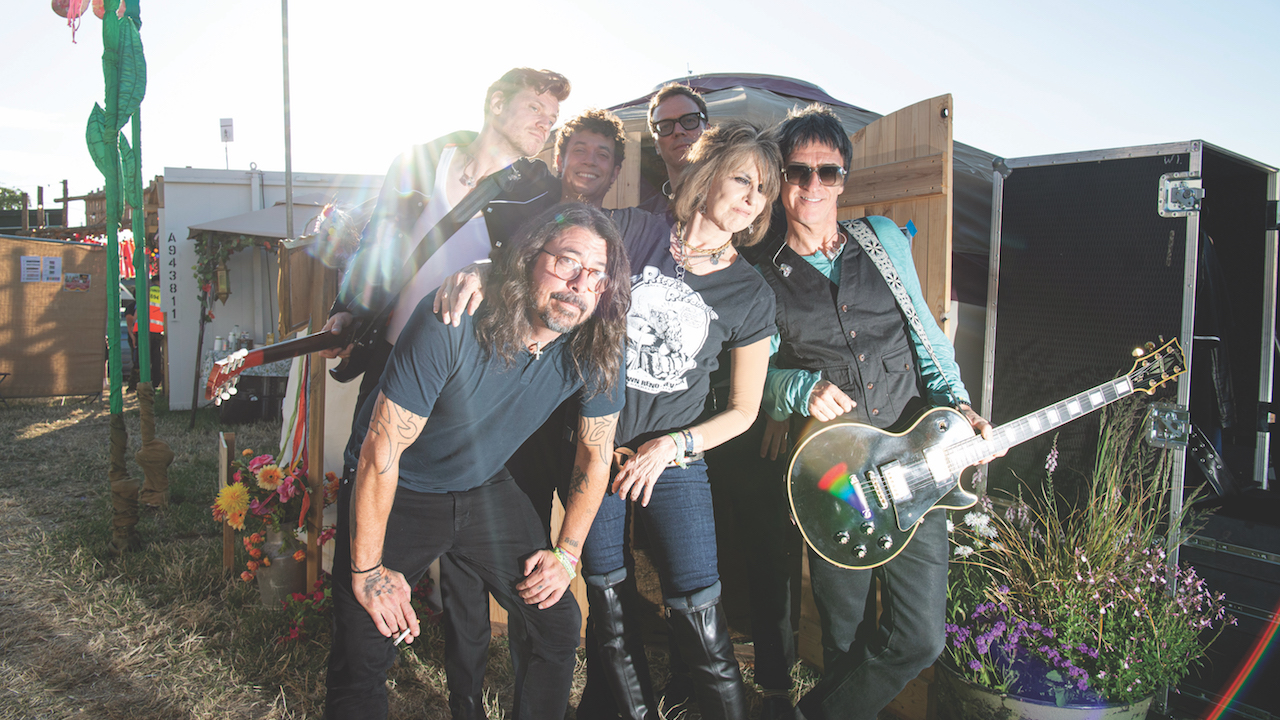
How do you two work out your guitar parts?
WALBOURNE I’d sit down and show Chrissie what the parts were, but when she plays rhythm it just sounds so much better. She’s a great rhythm player, but she just won’t admit it.
When we started playing together after two years of lockdown and she started finding her feet again as a guitarist, it completely changed the nature of the sound. Her guitar playing brings so much. We don’t sound the same when she’s not playing.
HYNDE It’s funny, because I use the guitar as a songwriting tool — I make no bones about it. In the early days, because I’m not a great guitar player, I wasn’t good enough to play along to the radio, so I started to make up my own little tunes.
I’ve never excelled at the guitar; I do what I do and I’ve been told that I have a certain style, but I think that might be a euphemism for “not very good.” [laughs] I’ll leave it at that. I think I do have a certain style that you can definitely hear on the first two albums in particular, although I think working with other people started to smooth me out.
The secret of my success is I've surrounded myself with some of the greatest guitar players you've ever seen. I know my limitations
Chrissie Hynde
During lockdown, I was desperate to do something as I was losing my chops altogether. I thought, Fuck me, I can’t even play anymore. I just started sinking. I was getting a little scared and I said to James that we should just start playing some little clubs.
James and I had a very specific game plan, which was to not do anything anymore unless it was fun. After lockdown — and having done supports at big stadiums, which has never been my cup of tea — I wanted to get back to the unpredictability of playing a club.
We’ve been doing stadium shows with Guns N’ Roses, which has been a blast, but in between dates, when we have a gap, we’ve also been doing shitty little club shows. That’s how we get our rocks off.
The stadium supports are really like a greatest-hits show for us, as it’s not primarily our audience, but when we do the clubs, we play all kinds of things — old album tracks and whatever, that only a Pretenders fan would know.
What got you into playing guitar?
HYNDE I think the biggest things that influenced my playing as a rhythm guitarist were Brian Jones from the Stones and Jimmy Nolen’s rhythm guitar on James Brown’s records. Something like “I Can’t Stand Myself (When You Touch Me),” where they’d have just the one chord all the way through.
I always loved the way that the rhythm never changed and just pinned everything down. I’m not fooling myself, saying I preferred rhythm, because I wasn’t good enough to play lead guitar, as I actually did want to play rhythm.
As far as my style goes, a lot of it came from writing things for myself. Then I’d play with someone and they’d say, “Hold on, you’ve left out a beat,” and I’d say, “No, that’s the way the song goes — just memorize it — don’t count it.” I think anyone who’s ever had to work with me has heard me say that at some time.
My playing has probably suffered over the years, because the secret of my success is that I’ve surrounded myself with some of the greatest guitar players you’ve ever seen. I know my limitations and I stick to what I do.
Did you know James Honeyman-Scott was special when you first got together?
HYNDE He always said that he didn’t like guitar solos and that he was more of a rhythm player. I forced solos out of him, and he was the best guitar player that I ever met. He just needed a nudge.
There are certain Pretenders songs that have to have his solos replicated to work. Did he plan those solos in the studio?
HYNDE I think he just knocked them out. When Johnny Marr played with us recently at Glastonbury, we were listening to an old interview with Jimmy in the van on the way back. I’d never heard it before — he was talking about his playing and guitars and things, and Johnny was a huge fan of Jimmy’s playing — and we were all just totally in rapture listening to this. He was a hero for all of us.
WALBOURNE When I joined the band, Chrissie said to me that she wasn’t bothered about me playing things exactly the same as Jimmy, but there are some parts that you do have to replicate.
I will play the old solos almost note-for-note on things like “Kid,” but there are some songs that give you a bit of wiggle room to put your own thing in.
Chrissie, you’ve worked with a lot of great guitarists over the years. What do you look for in a player?
HYNDE I can tell pretty fast if they’re going to be great. I think that’s my forte — knowing how everything fits and works together. I’m pretty average, but I have ears and I can tell what works right. They can see that I’ve got “primitive skills,” as Mike Tyson said of Frank Bruno.
I can say, “Can you not do that?” or “Lay out there,” or whatever, and they do it because they’re afraid I’m gonna yell at them, because I’m a girl. [laughs] But then it does sound better, and the guys seem to respect my role as a kind of ringleader, because the band sounds better for it.
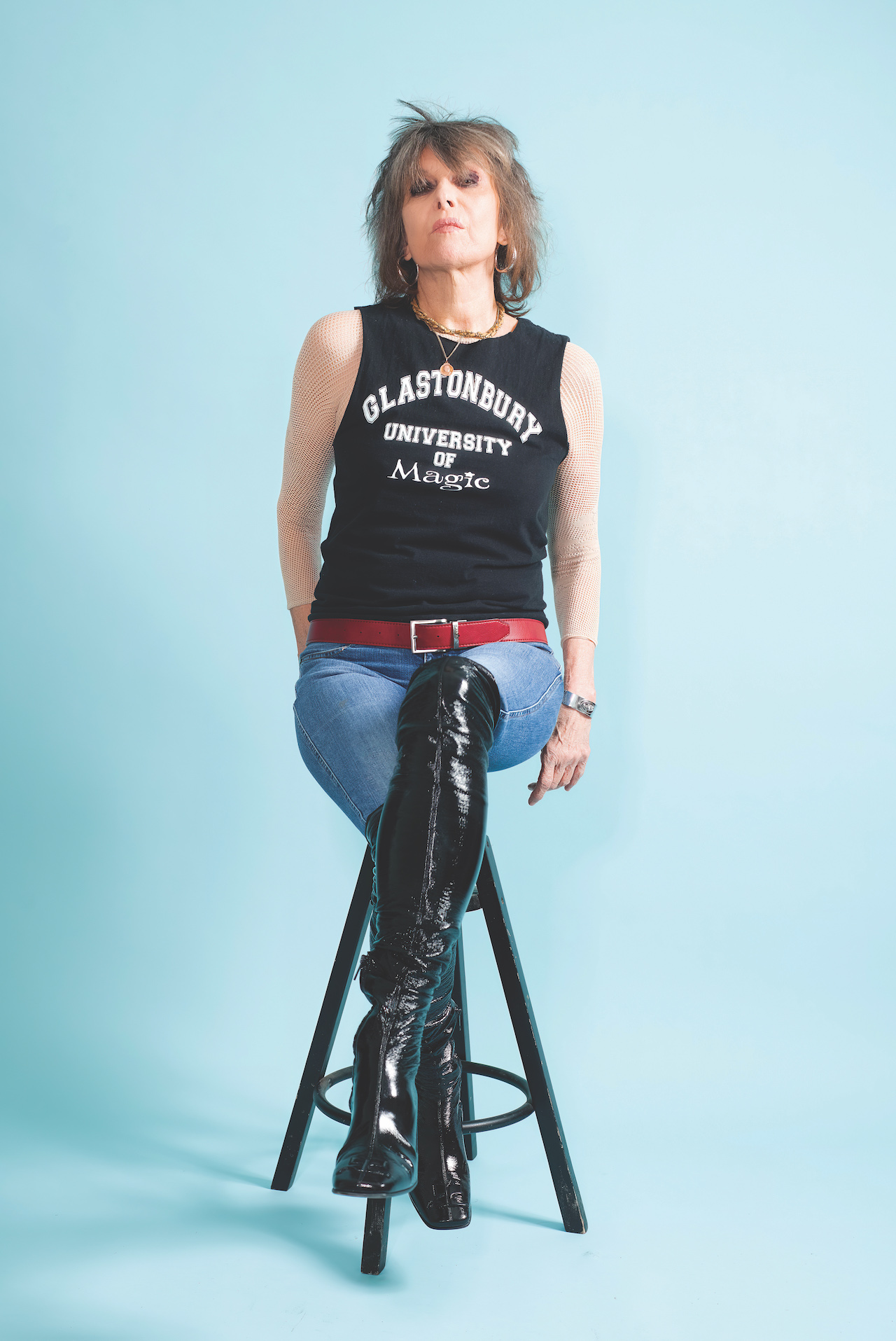
You two seem to have a solid partnership. Over the years there has been quite a shifting lineup in the band. Do you find it interesting to bring new people in with different energies?
HYNDE No, I don’t find it interesting! I don’t like it at all. I like to stick to the band, but things change, people change and they have families and other obligations or other problems. I know that the handful of bands that have kept the same lineup over the years often don’t like each other anymore.
Of course, I didn’t anticipate losing two band members to drugs all those years ago. But things change and I have to make decisions as a band leader. I feel my role is a bit like a soccer player — my job is to set the guitarist up so that he can put the ball in the back of the net.
WALBOURNE It’s all about personalities. You have to get along with the people in a tour bus more than anything. [laughs]
Her guitar playing brings so much; we just don't sound the same when Chrissie's not playing
James Walbourne
I feel that bands that don’t release new music and rely on rehashing their old hits live aren’t really fulfilling the remit of what a viable band should be about. What drives you to keep releasing new records?
WALBOURNE We always talk about music, every day — how to keep it fresh, moving forward and fun. You don’t want to be stuck in the past. Chrissie certainly doesn’t, and I’ve always been impressed by the way she pushes forward.
HYNDE And if you haven’t got the songs in you, I guess there’s nothing you can do about it. I know I get inspiration everywhere — just from mundane life and the way that you view it. I guess if you’re not feeling it, then maybe you shouldn’t do it. Look at a band like the Stones, though: They’ve been coming up with great songs for so long and still feel moved to come out with new music.
Your voice seems unchanged since the first album and you seem as fired-up as ever.
HYNDE I’m 72, and when you see all these other old-timers, like Mick, Bruce and Paul out there, people say to me, “Why are they still doing it when they don’t have to?” And I always say that none of us have to do this — it’s not about the money. There’s a certain excitement about it. Things change, but they stay the same.
You don’t want to be constantly living in the past and going back to what you used to do. You have to find new things that are a turn-on, or else you might as well throw in the towel. I think age has become irrelevant now.
Look at the people on the road: Willie Nelson, Bob Dylan… You know? The number-one criteria for me is if the music can make you laugh.
If there’s no joy, if things are too reverential, then it’s not right. It’s what turned you on at 15. Do you still feel that spark?
Relentless by the Pretenders is out now and available to buy or stream
